GOLU GROWS A NOSE for Class 7 ENGLISH
THEME
Golu, a baby elephant with a bulgy nose, lived at a time when elephants had no trunks. He was full of questions and wanted to know, amongst many other things, about the eating habits of crocodiles. When he finally meets one, the crocodile, true to his nature, talks Golu into coming close to the river and then catches him by the nose to pull him in and eat him up. But in this struggle of pulling and pulling, Golu’s nose grows very long. In the end, Golu learns not only about the dangers of trusting strangers, but also about the advantages of having a long nose!
THEME
Golu, a baby elephant with a bulgy nose, lived at a time when elephants had no trunks. He was full of questions and wanted to know, amongst many other things, about the eating habits of crocodiles. When he finally meets one, the crocodile, true to his nature, talks Golu into coming close to the river and then catches him by the nose to pull him in and eat him up. But in this struggle of pulling and pulling, Golu’s nose grows very long. In the end, Golu learns not only about the dangers of trusting strangers, but also about the advantages of having a long nose!
EXPLANATION
Golu, ek bulgy nose (उभरी हुई नाक) wala elephant ka bacha hai jo aise samay mein rehta tha jab elephants ki trunk (सूँड़) nahi hoti thi. Veh questions se bhara hua tha aur dusri baaton ki tarah, crocodiles ke khane ki habits ke bare mein janna chahta tha. Jab veh end mein ek crocodile se milta hai, toh crocodile, apne nature ke anusar, Golu ko river ke paas aane ke liye kehta hai aur andar kheech leta hai aur use kha jata hai. Lekin apne aap ko bachane ki struggle (हाथापाई) mein Golu ki nose bahut lambi ho jati hai. End mein, Golu na kewal strangers (अजनबी) par trust (भरोसा) karne ke danger (खतरा) ke bare mein seekhta hai, balki lambi nose hone ke advantages (फ़ायदे) ke bare mein seekhta hai!
EXPLANATION
गोलू, एक उभरी हुई नाक वाला हाथी का बच्चा है जो ऐसे समय में रहता था जब हाथियों की सूंड नहीं होती थी। वह सवालों से भरा हुआ था और कई अन्य बातों के अलावा, मगरमच्छों के खाने की आदतों के बारे में जानना चाहता था। जब वह अंत में एक मगरमच्छ से मिलता है, तो मगरमच्छ, अपने स्वभाव के अनुसार, गोलू को नदी के करीब आने के लिए कहता है और फिर उसे नाक से पकड़कर अंदर खींच लेता है और खा जाता है। लेकिन खींचते खींचते गोलू की नाक बहुत लंबी हो जाती है। अंत में, गोलू न केवल अजनबियों पर भरोसा करने के खतरों के बारे में सीखता है, बल्कि लंबी नाक होने के फायदों के बारे में भी सीखता है!
ABOUT THE AUTHOR
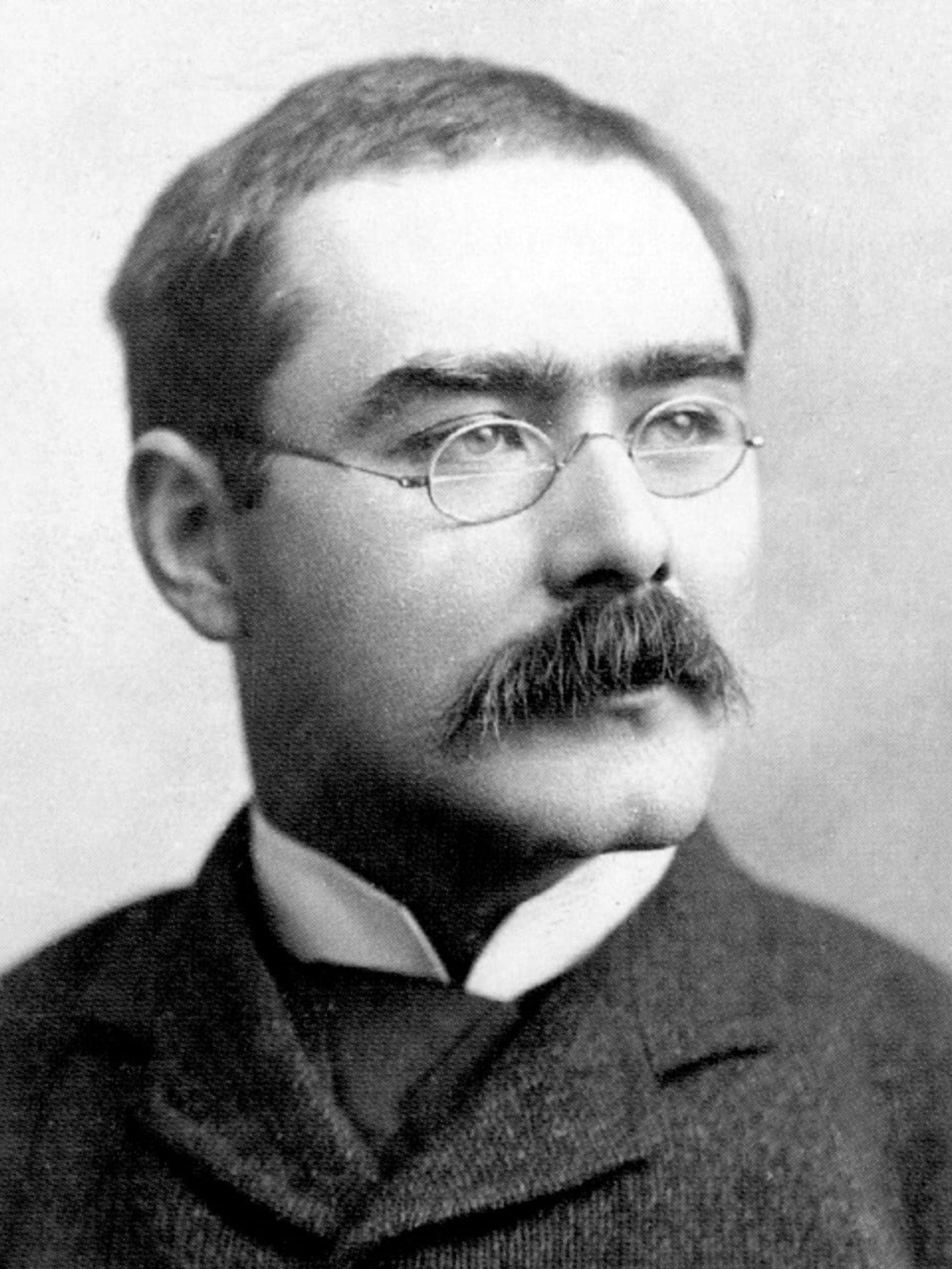
Joseph Rudyard Kipling (30 December 1865 – 18 January 1936) was an English journalist, short-story writer, poet, and novelist. He was born in India, which inspired much of his work.
ABOUT THE AUTHOR

Joseph Rudyard Kipling (30 December 1865 – 18 January 1936) was an English journalist, short-story writer, poet, and novelist. He was born in India, which inspired much of his work.
EXPLANATION
Joseph Rudyard Kipling (30 December 1865 - 18 January 1936) ek angrezi patrakar, short story lekhak, kavi aur upanyaskar the. Unka janam bharat mein hua tha, jisne unke adhikansh karyo ko prerit kiya.
EXPLANATION
जोसेफ रुडयार्ड किपलिंग (30 दिसंबर 1865 - 18 जनवरी 1936) एक अंग्रेजी पत्रकार, लघु-कथा लेखक, कवि और उपन्यासकार थे। उनका जन्म भारत में हुआ था, जिसने उनके अधिकांश कार्यों को प्रेरित किया।
PARAGRAPH 1
LONG, long ago the elephant had no trunk. He had only a bulgy nose, as big as a boot. He could wiggle it from side to side, but couldn’t pick up things with it.
PARAGRAPH 1
LONG, long ago the elephant had no trunk. He had only a bulgy nose, as big as a boot. He could wiggle it from side to side, but couldn’t pick up things with it.
IMPORTANT WORDS
Trunk: an elephant’s long nose, हाथी की सूँड़
Bulgy: swollen, protruding, or curving outwards, उभार
Wiggle: to move from side to side with small quick movements; to make something do this, तेज़ी से हिलना-डुलनाः तेज़ी से (किसी को) हिलाना-डुलाना
IMPORTANT WORDS
Trunk: सूंड
Bulgy: उभार
Wiggle: लचीलापन देना
EXPLANATION
Bahut pehle, elephant ki trunk (सूँड़) nahi thi. Uske paas sirf ek bulgy nose (उभरी हुई नाक) thi, jo ek shoes jitni badi thi. Veh ise ek taraf se doosri taraf ghuma sakta tha, lekin usse cheezein nahi utha sakta tha.
EXPLANATION
बहुत पहले, हाथी की सूंड नहीं होती थी। उसके पास केवल एक उभरी हुई नाक थी, जो एक बूट (जूते) जितनी बड़ी थी। वह इसे एक तरफ़ से दूसरी तरफ घुमा सकता था, लेकिन उससे चीज़ों को उठा नहीं सकता था।
PARAGRAPH 2
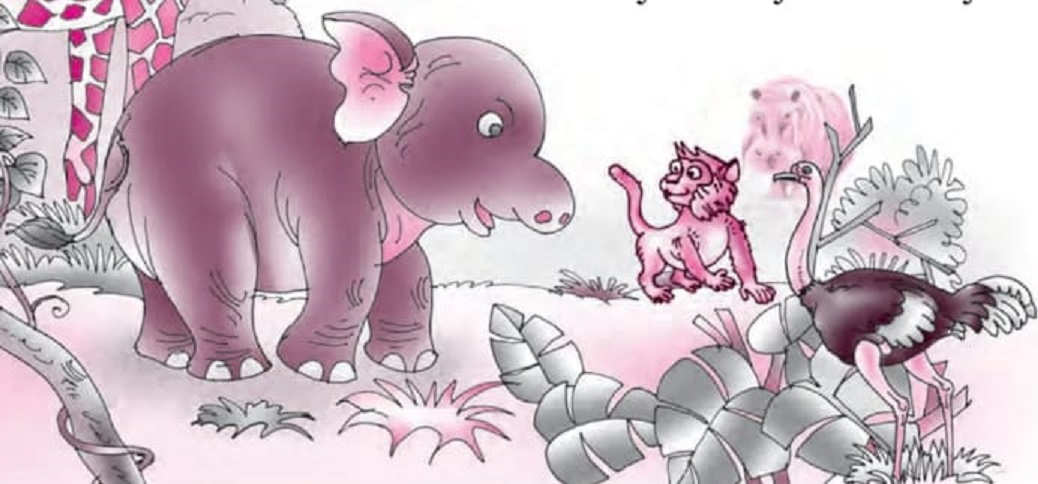
There was a baby elephant called Golu. He, too, had no trunk but only a bulgy nose, as small as a small boot. Golu was full of questions. He asked his tall aunt, the ostrich, “Why don’t you ever fly like other birds?” Then he asked his tall uncle, the giraffe, “What makes your skin so spotty?” He asked his huge uncle, the hippopotamus, “Why are your eyes always so red?” He asked his hairy uncle, the baboon, “Why do melons taste like melons?” The ostrich, the giraffe, the hippopotamus and the baboon had no answers to Golu’s questions. “Golu is a naughty baby,” they said. “He asks such difficult questions.”
PARAGRAPH 2
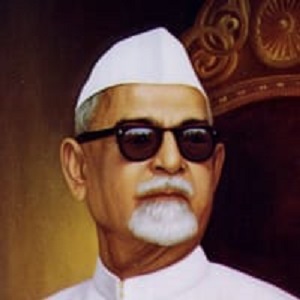
There was a baby elephant called Golu. He, too, had no trunk but only a bulgy nose, as small as a small boot. Golu was full of questions. He asked his tall aunt, the ostrich, “Why don’t you ever fly like other birds?” Then he asked his tall uncle, the giraffe, “What makes your skin so spotty?” He asked his huge uncle, the hippopotamus, “Why are your eyes always so red?” He asked his hairy uncle, the baboon, “Why do melons taste like melons?” The ostrich, the giraffe, the hippopotamus and the baboon had no answers to Golu’s questions. “Golu is a naughty baby,” they said. “He asks such difficult questions.”
IMPORTANT WORDS
Spotty: having spots, धब्बेदार
IMPORTANT WORDS
Spotty: धब्बेदार
EXPLANATION
Golu naam ka ek chota elephant tha. Uske paas bhi koi trunk nahi thi, par sirf ek bulgy nose thi, jo ek boot (जूता) jitni choti thi. Golu questions se bhara hua tha. Usne apni lambi chachi ostrich se pucha, "Aap kabhi dusre birds ki tarah kyu nahi udti?" Phir usne apne lambe chacha giraffe se pucha, "Apki skin itni spotty (धब्बों से भरी हुई) kyu hai?" Usne apne bade chacha hippopotamus se pucha, "Apki eyes humesha itni red (लाल) kyu rehti hai?" Usne apne balo wale chacha, baboon se pucha, "Melon (खरबूजा) ka taste melon ki tarah kyu hota hai?" Ostrich, giraffe, hippopotamus aur baboon ke paas Golu ke questions ka koi answer nahi tha. Unhone kaha, "Golu ek shararti bacha hai. Veh itne difficult questions puchta hai."
EXPLANATION
गोलू नाम का एक छोटा हाथी था। उसके पास भी कोई सूंड नहीं थी, लेकिन केवल एक उभरी हुई नाक थी, जो एक छोटे बूट जितनी छोटी थी। गोलू सवालों से भरा हुआ था। उसने अपनी लंबी चाची, शुतुरमुर्ग से पूछा, "आप कभी अन्य पक्षियों की तरह क्यों नहीं उड़ती?" फिर उसने अपने लंबे चाचा जिराफ से पूछा, "आपकी त्वचा इतनी धब्बेदार क्यों है?" उसने अपने बड़े चाचा हिप्पोपॉटेमस से पूछा, "आपकी आँखें हमेशा इतनी लाल क्यों रहती हैं?" उसने अपने बालों वाले चाचा, बबून से पूछा, "खरबूजे का स्वाद खरबूजे की तरह क्यों होता है?" शुतुरमुर्ग, जिराफ, हिप्पोपॉटेमस और बबून के पास गोलू के सवालों का कोई जवाब नहीं था। "गोलू एक शरारती बच्चा है," उन्होंने कहा। "वह ऐसे कठिन प्रश्न पूछता है।"
PARAGRAPH 3
One day Golu met the mynah bird sitting in the middle of a bush, and he asked her, “What does the crocodile have for dinner?” The mynah said, “Go to the banks of the great, grassy Limpopo river and find out.”
PARAGRAPH 3
One day Golu met the mynah bird sitting in the middle of a bush, and he asked her, “What does the crocodile have for dinner?” The mynah said, “Go to the banks of the great, grassy Limpopo river and find out.”
IMPORTANT WORDS
Middle: the part, point or position that is at about the same distance from the two ends or sides of something, बीच में
IMPORTANT WORDS
Middle: बीच में
EXPLANATION
Ek din Golu ek jhadi ke beech beithe hue mynah (मैना) bird se mila, aur usne usse pucha, "Crocodile ke paas raat ke khane mein kya hai?" Mynah ne kaha, "Great, grass wali Limpopo river ke kinare par jao aur Apne aap pata lagao."
EXPLANATION
एक दिन गोलू एक झाड़ी के बीच बैठे मैना पक्षी से मिला, और उसने उससे पूछा, "मगरमच्छ के पास रात के खाने में क्या है?" मैना ने कहा, "महान, घास वाली लिम्पोपो नदी के तट पर जाओ और अपने आप पता लगाओ।"
PARAGRAPH 4
Golu went home. He took a hundred sugar canes, fifty dozen bananas and twenty-five melons. Then he said to his family, “Goodbye. I’m going to the great, grassy Limpopo river. I’ll find out what the Crocodile has for dinner.” He had never seen a crocodile, and didn’t know what one looked like.
PARAGRAPH 4
Golu went home. He took a hundred sugar canes, fifty dozen bananas and twenty-five melons. Then he said to his family, “Goodbye. I’m going to the great, grassy Limpopo river. I’ll find out what the Crocodile has for dinner.” He had never seen a crocodile, and didn’t know what one looked like.
IMPORTANT WORDS
Dinner: main meal of the evening, रात का खाना
IMPORTANT WORDS
Dinner: रात का खाना
EXPLANATION
Golu ghar chala gaya. Usne 100 sugarcane (गन्ने), 50 darjan bananas (केले) aur 25 melons (खरबूजे) liye. Phir usne apni family se kaha, "Goodbye. Main great, grass wali Limpopo river par jaa raha hun. Mai pata lagaunga ki raat ke khane mein crocodile ke paas kya hai." Usne kabhi crocodile nahi dekha tha, aur veh nahi janta tha ki veh kaisa dikhta hai.
EXPLANATION
गोलू घर चला गया। उसने सौ गन्ने, पचास दर्जन केले और पच्चीस खरबूजे लिए। फिर उसने अपने परिवार से कहा, “अलविदा। मैं महान, घास वाली लिम्पोपो नदी पर जा रहा हूँ। मैं पता लगाऊँगा कि रात के खाने में मगरमच्छ के पास क्या है।” उसने कभी मगरमच्छ नहीं देखा था, और वह नहीं जानता था कि वह कैसा दिखता है।
PARAGRAPH 5
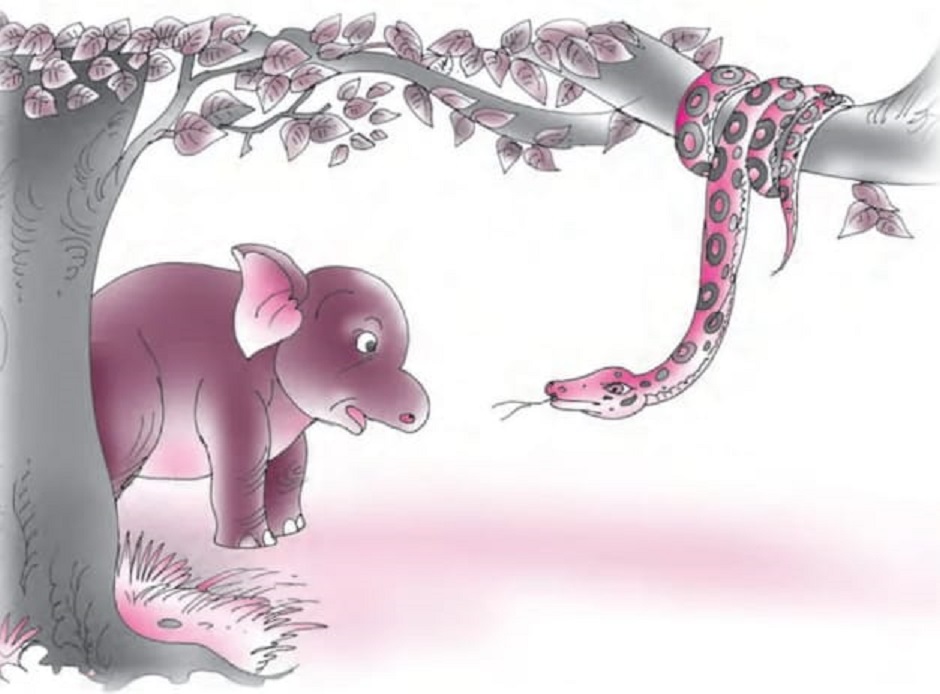
He met a python and asked him, “Have you ever seen a crocodile? What does he look like? What does he have for dinner?”
The python uncoiled himself from the branch of a tree but said nothing. Golu politely helped him to coil around the branch again and said goodbye to him.
PARAGRAPH 5
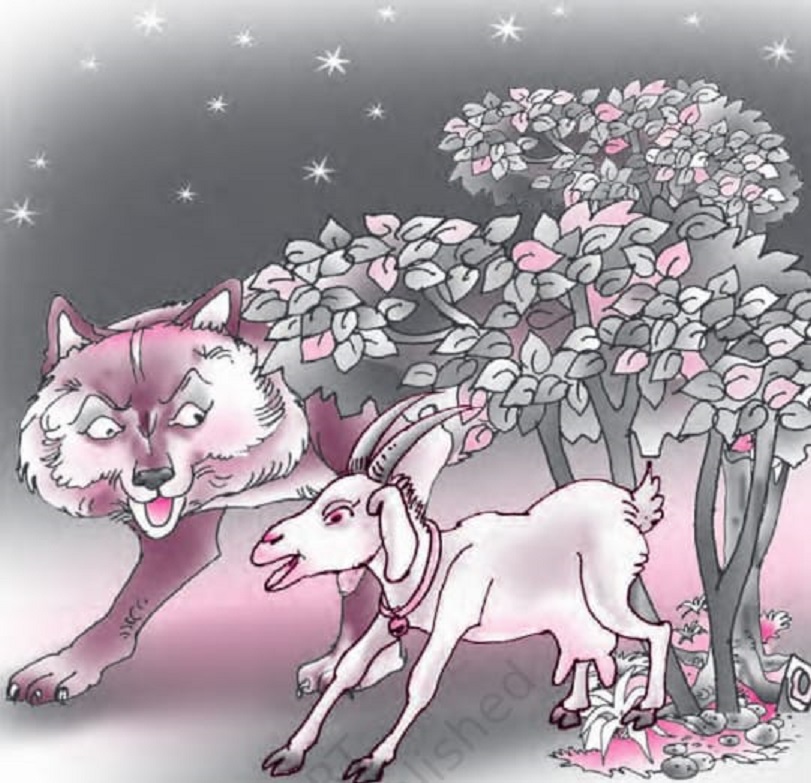
He met a python and asked him, “Have you ever seen a crocodile? What does he look like? What does he have for dinner?”
The python uncoiled himself from the branch of a tree but said nothing. Golu politely helped him to coil around the branch again and said goodbye to him.
IMPORTANT WORDS
Uncoiled: straighten or cause to straighten from a coiled or curled position, खोलना
Polite: having good manners and showing respect for others, आराम से
IMPORTANT WORDS
Uncoiled: खोलना
Polite: आराम से
EXPLANATION
Veh ek python (अजगर) se mila aur usse pucha, "Kya tumne kabhi crocodile dekha hai? Veh kaisa dikhta hai? Uske paas raat ke khane ke liye kya hai?"
Python ek tree ki branch (पेड़ की शाखा) se niche utra lekin usne Golu se kuch nahi kaha. Golu ne politely (विनम्रता से) use phir se branch par lipat jane mein uski help ki aur use goodbye kaha.
EXPLANATION
वह एक अजगर से मिला और उससे पूछा, “क्या तुमने कभी मगरमच्छ देखा है? वह कैसा दिखता है? उसके पास रात के खाने के लिए क्या है?"
अजगर एक पेड़ की शाखा से नीचे उतरा लेकिन उसने कुछ नहीं कहा। गोलू ने विनम्रता से उसे फिर से शाखा के चारों ओर चक्कर लगाने में मदद की और उसे अलविदा कह दिया।
PARAGRAPH 6
Golu moved on, eating sugar canes, bananas and melons. After a few days he reached the very edge of the great, grassy Limpopo river. On the bank of the river he saw a log of wood.
It was really the crocodile who winked at him. “Excuse me,” said Golu. “Have you ever seen a crocodile?”
PARAGRAPH 6
Golu moved on, eating sugar canes, bananas and melons. After a few days he reached the very edge of the great, grassy Limpopo river. On the bank of the river he saw a log of wood.
It was really the crocodile who winked at him. “Excuse me,” said Golu. “Have you ever seen a crocodile?”
IMPORTANT WORDS
Reached: to arrive at a place or condition that you have been going towards, स्थान पर या स्थिति में पहुँचना
Winked: to close and open one eye very quickly, usually as a signal to somebody, जल्दी-जल्दी पलक झपकना या आँख मिचमिचाना (प्रायः किसी को इशारे के रूप में)
IMPORTANT WORDS
Reached: पहुंचना
Winked: आंख मारना
EXPLANATION
Sugar canes, bananas aur melons kha kar Golu aage badh gaya. Kuch dino ke baad veh great, grass wali Limpopo river ke kinare par pahunch gaya. River ke kinare usne wood ka ek log (लकड़ी का लट्ठा) dekha.
Par asal mein veh crocodile tha joh wahan leta hua tha. "Excuse me (मुझे माफ कीजिए)," Golu ne kaha. "Kya aapne kabhi crocodile dekha hai?"
EXPLANATION
गन्ने, केले और खरबूजे खाकर गोलू आगे बढ़ गया। कुछ दिनों के बाद वह महान, घास वाली लिम्पोपो नदी के किनारे पर पहुँच गया। नदी के किनारे उसने लकड़ी का एक लट्ठा देखा।
पर असल में वह मगरमच्छ था जो वहाँ लेटा हुआ था। "क्षमा करें," गोलू ने कहा। "क्या आपने कभी मगरमच्छ देखा है?"
PARAGRAPH 7
The crocodile winked again and lifted half his tail out of the mud. “Come here, little one,” said the crocodile. “Why do you ask such questions?”
“I want to know...”
“Come close, little one, for I am the crocodile,” and he shed crocodile tears to show it was quite true.
PARAGRAPH 7
The crocodile winked again and lifted half his tail out of the mud. “Come here, little one,” said the crocodile. “Why do you ask such questions?”
“I want to know...”
“Come close, little one, for I am the crocodile,” and he shed crocodile tears to show it was quite true.
IMPORTANT WORDS
Mud: soft, wet earth, कीचड़
IMPORTANT WORDS
Mud: मिट्टी
EXPLANATION
Crocodile ne phir apni palak jhapkai aur apni adhi tail (पूँछ) ko kichad se bahar nikal liya. "Yaha aao chote bache," Crocodile ne kaha. "Tum aise questions kyu puch rahe ho?"
"Mai janna chahta hun…"
"Paas aao, chote bache, kyunki main crocodile hun," aur usne yeh dikhane ke liye crocodile ke tears (मगरमच्छ के आँसू) bahaye taki Golu ko yakeen ho jaye ki yeh sach hai .
EXPLANATION
मगरमच्छ ने फिर पलक झपकाई और अपनी आधी पूंछ को कीचड़ से बाहर निकाल लिया। "यहाँ आओ, छोटे बच्चे," मगरमच्छ ने कहा। "आप ऐसे सवाल क्यों पूछ रहे हैं?"
"मैं जानना चाहता हूँ..."
"निकट आओ, छोटे, क्योंकि मैं मगरमच्छ हूँ," और उसने यह दिखाने के लिए मगरमच्छ के आँसू बहाए ताकि गोलू को यकीन हो जाये की यह सच था।
PARAGRAPH 8
Golu was afraid, but he sat down on the bank and said, “You are the very person I was looking for. Please tell me What you have for dinner.”
“Come here, little one, and I’ll whisper the answer to you,” said the crocodile.
Golu put his head down close to the crocodile’s snout and the crocodile caught him by the nose.
PARAGRAPH 8
Golu was afraid, but he sat down on the bank and said, “You are the very person I was looking for. Please tell me What you have for dinner.”
“Come here, little one, and I’ll whisper the answer to you,” said the crocodile.
Golu put his head down close to the crocodile’s snout and the crocodile caught him by the nose.
IMPORTANT WORDS
Afraid: sacred, डरना
Caught: to catch, पकड़ना
IMPORTANT WORDS
Afraid: डरना
Caught: पकड़ना
EXPLANATION
Golu dar gaya, lekin veh kinare par baith gaya aur usne kaha, "Tum wahi ho jise mai dhoond raha tha. Please mujhe batao ki aapke paas raat ke khane ke liye kya hai."
Crocodile ne Golu se kaha, "Yaha aao, chote bache, main tumhe tumare saare answer dheere se batata hun."
Golu ne apna sar crocodile ke snout (नाक) par rakh diya aur crocodile ne Golu ko uski nose se pakad liya.
EXPLANATION
गोलू डर गया, लेकिन वह किनारे पर बैठ गया और कहा, "तुम वही हो जिसे मैं ढूंढ रहा था। कृपया मुझे बताएं कि आपके पास रात के खाने के लिए क्या है।"
"यहाँ आओ, छोटे बच्चे, मैं तुम्हें तुम्हारे सरे प्रश्नों का उत्तर देता हूँ," मगरमच्छ ने कहा।
गोलू ने अपना सर मगरमच्छ की नाक के पास रख दिया और मगरमच्छ ने उसे नाक से पकड़ लिया।
PARAGRAPH 9
“I think,” said the crocodile, “today a baby elephant will be my dinner.”
“Let me go. You are hurting me, Mr Crocodile,” screamed Golu.
The python, who had been quietly following Golu, came to the bank and said, “If you do not pull as hard as you can, the crocodile will drag you into the stream.”
PARAGRAPH 9
“I think,” said the crocodile, “today a baby elephant will be my dinner.”
“Let me go. You are hurting me, Mr Crocodile,” screamed Golu.
The python, who had been quietly following Golu, came to the bank and said, “If you do not pull as hard as you can, the crocodile will drag you into the stream.”
IMPORTANT WORDS
Hurting: to cause somebody/yourself physical pain or injury, अपने या किसी को तकलीफ़ देना या चोट पहुँचाना
Screamed: to cry out loudly in a high voice because you are afraid, excited, angry, in pain, etc., ज़ोर से चीख़ना (डर, उत्तेजना, ग़ुस्सा, दर्द आदि के कारण)
IMPORTANT WORDS
Hurting: दर्द पहुंचाना
Screamed: चिल्लाना
EXPLANATION
Crocodile ne kaha, "Mujhe lagta hai aaj ek elephant ka bacha mera raat ka khana hoga."
Golu chillate hue bola, "Mujhe jane do. Aap mujhe chot pahucha rahe hai."
Python (अजगर), jo chupchap Golu ka picha kar raha tha, kinare par aya aur usne kaha, "Agar tum puri takat se apne aap ko baahar nahi khichoge, toh crocodile tumhe andar pani mein kheech lega."
EXPLANATION
"मुझे लगता है," मगरमच्छ ने कहा, "आज एक हाथी का बच्चा मेरा रात का भोजन होगा।"
“मुझे जाने दो। आप मुझे चोट पहुँचा रहे हैं, मिस्टर क्रोकोडाइल," गोलू चिल्लाया।
अजगर, जो चुपचाप गोलू का पीछा कर रहा था, किनारे पर आया और बोला, "अगर तुम पूरी ताकत से अपने आप को बाहर नहीं खींचेंगे, तो मगरमच्छ तुम्हें अंदर पानी में खींच लेगा।"
PARAGRAPH 10
Golu sat back on his little haunches and pulled and pulled. The crocodile slipped into the water making it all creamy with great sweeps of his tail, and he also pulled and pulled.
PARAGRAPH 10
Golu sat back on his little haunches and pulled and pulled. The crocodile slipped into the water making it all creamy with great sweeps of his tail, and he also pulled and pulled.
IMPORTANT WORDS
Haunches: the back end of an animal, including the tops of its back legs; a person’s bottom and the tops of his or her legs, पशु का पुट्ठा; स्त्री या पुरुष का नितंब, जांघ
IMPORTANT WORDS
Haunches: जांघ
EXPLANATION
Golu vapas apne nanhi kamar ke sahare baith gaya aur apne aap ko baahar ke taraf kheenchta raha. Crocodile pani mein fisal gaya aur uski poonch hilne ki vajah se sab kuch kichad se ganda ho gaya, aur veh bhi Golu ko ander pani mein kheencha aur kheenchta raha.
EXPLANATION
गोलू वापस अपने नन्हे कमर के सहारे बैठ गया और अपने आप को बाहर की तरफ खींचता रहा। मगरमच्छ पानी में फिसल गया और उसकी पूंछ के हिलने की वजह से सब कुछ कीचड़ से गंदा हो गया, और वह भी गोलू को अंदर खींचने का प्रयास करता रहा।
PARAGRAPH 11
Then the python coiled himself round Golu’s stomach and said, “Let’s pull harder.” Golu dug in all his four legs in the mud and pulled. The nose kept on stretching. At each pull the nose grew longer and longer and it hurt Golu. The nose was now five feet long, but it was free at last.
PARAGRAPH 11
Then the python coiled himself round Golu’s stomach and said, “Let’s pull harder.” Golu dug in all his four legs in the mud and pulled. The nose kept on stretching. At each pull the nose grew longer and longer and it hurt Golu. The nose was now five feet long, but it was free at last.
IMPORTANT WORDS
Stretching: To lengthen, widen, or distend, फैलना, खींचना
IMPORTANT WORDS
Stretching: फैलना, खींचना
EXPLANATION
Phir python ne Golu ke stomach (पेट) par khud ko lapet liya aur kaha, "Chalo aur zor se khichte hain." Golu ne apne charo pairon ko khichad mein dhasa liya aur phir apne aap ko bahar khichane laga. Golu ki nse khichti rahi. Har ek baar khichne par uski nose lambi aur lambi hoti gayi aur isse Golu ko chot bhi lag rahi thi. Golu ki nose ab 5 foot lambi ho gayi thi, lekin end mein usne apne aap ko crocodile se bacha liya tha.
EXPLANATION
फिर अजगर ने गोलू के पेट पर खुद को लपेट लिया और कहा, "चलो और ज़ोर से खींचते हैं।" गोलू ने अपने चारों पैरों को कीचड़ में धसा लिया और अपने आप को बाहर खींचने लगा। गोलू की नाक खींचती रही। प्रत्येक खिंचाव पर नाक लंबी और लंबी होती गई और इससे गोलू को चोट भी लग रही थी। नाक अब पाँच फुट लंबी हो गई थी, लेकिन आखिर में उसने अपने आप को बचा लिया था।
PARAGRAPH 12
Golu sat down, with his nose wrapped up in a big banana leaf and hung it in the great, grassy Limpopo river to cool. Golu sat there for two days waiting for his nose to cool and to shrink. It grew cool but it didn’t shrink.
PARAGRAPH 12
Golu sat down, with his nose wrapped up in a big banana leaf and hung it in the great, grassy Limpopo river to cool. Golu sat there for two days waiting for his nose to cool and to shrink. It grew cool but it didn’t shrink.
IMPORTANT WORDS
Wrapped: to put paper or cloth around somebody/something as a cover, किसी वस्तु पर काग़ज़ चढ़ाना या किसी व्यकि्त पर कपड़ा लपेटना
Shrink: to become smaller or make something smaller, सिकुड़ना
IMPORTANT WORDS
Wrapped: बांधना
Shrink: सिकुड़ना
EXPLANATION
Golu baith gaya, uski nose ko ek badi banana leaf (केले का पत्ता) mein wrap (लिपटी हुई) karke thanda karne ke liye great, graas wali Limpopo river mein latka diya tha. Golu do dino tak vahi baitha raha aur apni nose ka thanda hone aur shrink (सिकुड़ने) ka wait (इंतज़ार) karta raha. Uski nose thandi to ho gayi lekin shrink nahi hui.
EXPLANATION
गोलू बैठ गया, उसकी नाक एक बड़े केले के पत्ते में लपेट कर उसे ठंडा करने के लिए महान, घास वाली लिम्पोपो नदी में लटका दिया। गोलू दो दिनों तक वहीं बैठा रहा और अपनी नाक के ठंडा होने और सिकुड़ने का इंतज़ार करता रहा। यह ठंडा हुआ लेकिन सिकुड़ा नहीं।
PARAGRAPH 13
At the end of the second day, a fly came and stung Golu on the shoulder. Golu lifted his long nose (trunk) and with it hit the fly dead.
“Advantage number one,” hissed the python.“You couldn’t have done it with a small nose. Try and eat a little now.”
PARAGRAPH 13
At the end of the second day, a fly came and stung Golu on the shoulder. Golu lifted his long nose (trunk) and with it hit the fly dead.
“Advantage number one,” hissed the python.“You couldn’t have done it with a small nose. Try and eat a little now.”
IMPORTANT WORDS
Stung: (of an insect, a plant, etc.) to prick the skin of a person or animal with a poisonous, sharp-pointed part causing sudden pain, डंक मरना
IMPORTANT WORDS
Stung: डंक मरना
EXPLANATION
Dusre din ke end mein, ek makkhi ne aakar Golu ko shoulder (कंधे) par dunk maar diya. Golu ne apni lambi trunk (सूँड़) uthai jiski wajah se makkhi mar gayi.
"Advantage (लाभ, फ़ायदा) number 1," Python ne kaha. "Tum yeh kaam choti nose se nahi kar sakte the. Koshish karte raho aur abhi thoda kuch kha lo."
EXPLANATION
दूसरे दिन के अंत में, एक मक्खी ने आकर गोलू को कंधे पर काट लिया। गोलू ने अपनी लंबी नाक (ट्रंक) उठाई और इससे मक्खी मर गई।
"लाभ नंबर एक," अजगर ने कहा। "तुम इसे छोटी नाक से नहीं कर सकते थे। कोशिश करते रहो और अभी थोड़ा खाना खा लो।"
PARAGRAPH 14
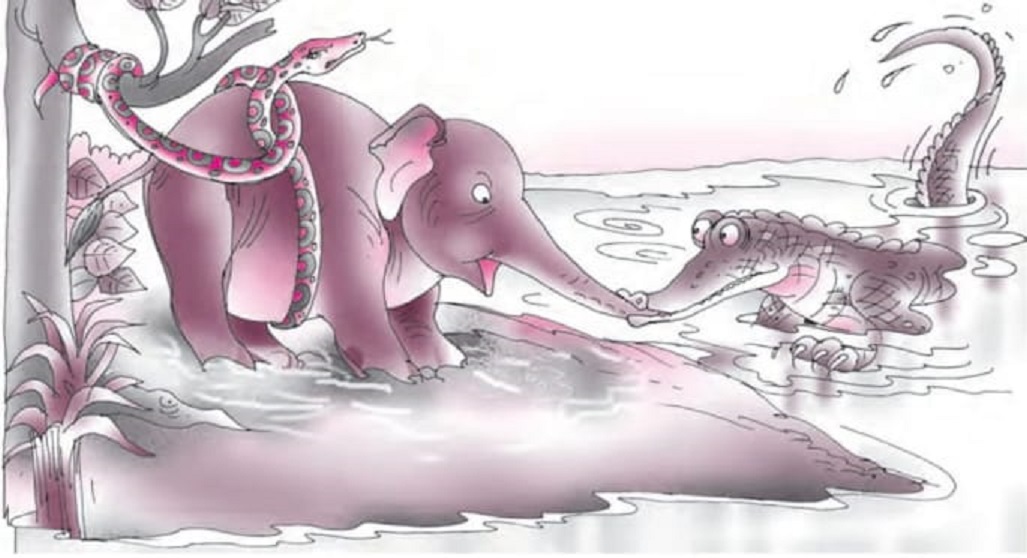
Golu put out his trunk and plucked a large bundle of grass. He dusted it against his forelegs and stuffed it into his mouth.
“Advantage number two,” hissed the python. “You couldn’t have done it with a small nose. Don’t you think the sun is too hot now?”
PARAGRAPH 14
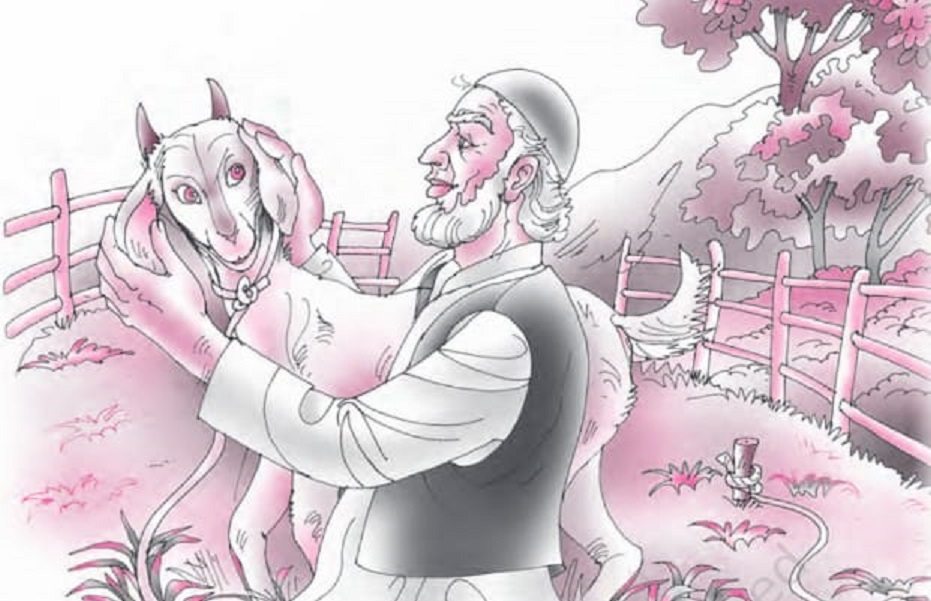
Golu put out his trunk and plucked a large bundle of grass. He dusted it against his forelegs and stuffed it into his mouth.
“Advantage number two,” hissed the python. “You couldn’t have done it with a small nose. Don’t you think the sun is too hot now?”
IMPORTANT WORDS
Bundle: a number of things tied or folded together, गुच्छा
IMPORTANT WORDS
Bundle: गुच्छा
EXPLANATION
Golu ne apni trunk bahar nikali aur grass ka ek bada bundle (गट्ठर) tod liya. Usne apne forelegs (आगे के पैर) par jhad kar kha liya.
"Advantage number 2," Python ne kaha. "Tum ise choti nose se nahi kar sakte the. Kya tumhe nahi lagta ki sun ab bahut hot (गर्म) hai?"
EXPLANATION
गोलू ने अपनी सूंड बाहर निकाली और घास का एक बड़ा गट्ठर तोड़ लिया। उसने उसे अपने अग्र पैरों पर झाड़ा और अपने मुँह में भर लिया।
"लाभ नंबर दो," अजगर ने कहा। "तुम इसे छोटी नाक से नहीं कर सकते थे। क्या तुम्हें नहीं लगता कि सूरज अब बहुत गर्म है?"
PARAGRAPH 15
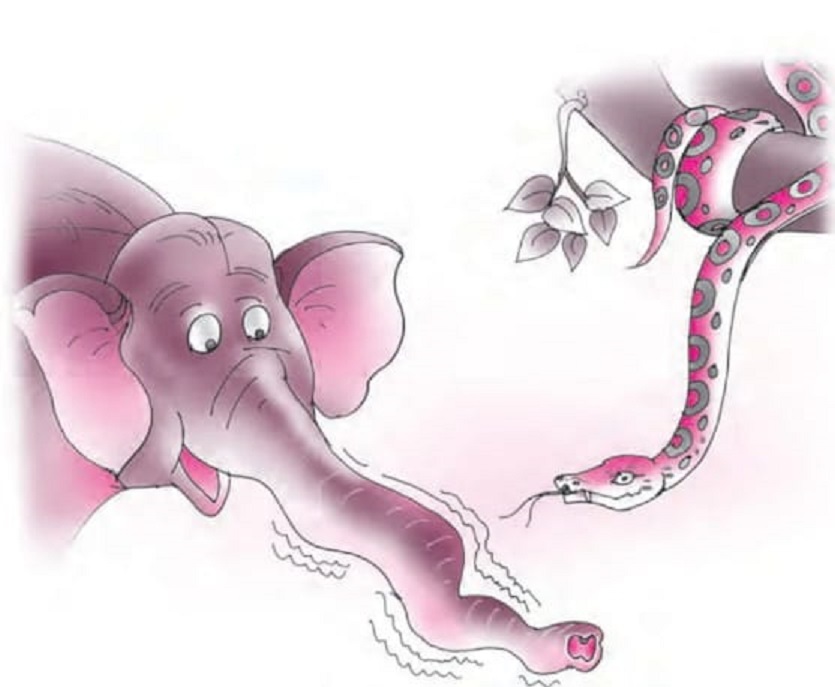
Golu scooped up some mud from the bank and slapped It on his head.
“Advantage number three,” hissed the python. “You couldn’t have done it with a small nose.”
“Thank you, Mr Python,” said Golu gratefully. “I’ll remember all this and now I’ll go back to my family.”
PARAGRAPH 15
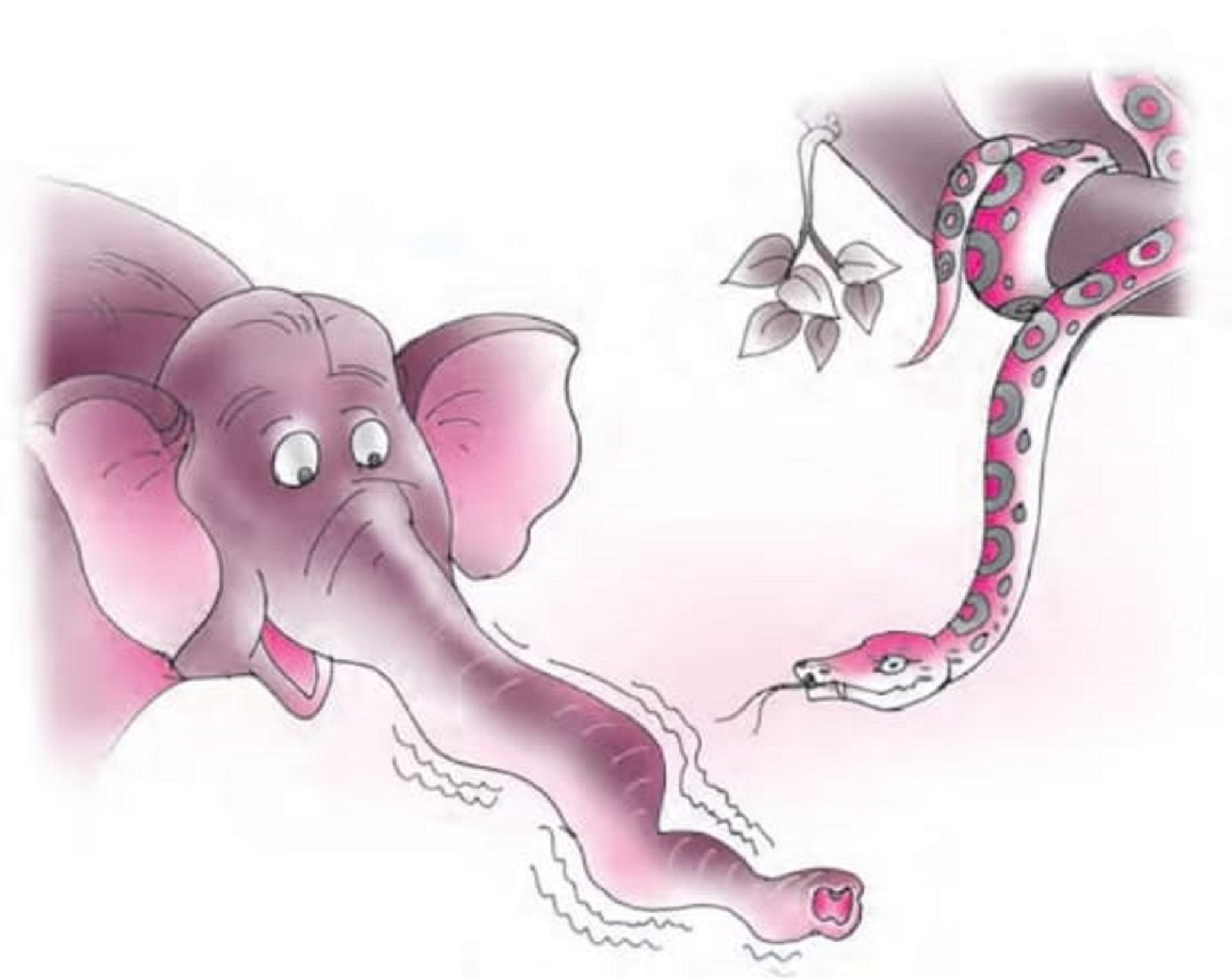
Golu scooped up some mud from the bank and slapped It on his head.
“Advantage number three,” hissed the python. “You couldn’t have done it with a small nose.”
“Thank you, Mr Python,” said Golu gratefully. “I’ll remember all this and now I’ll go back to my family.”
IMPORTANT WORDS
Slapped: to hit somebody/something with the inside of your hand when it is flat, थप्पड़ मारना
Gratefully: feeling or showing thanks, आभार
IMPORTANT WORDS
Slapped: थप्पड़ मरना
Gratefully: आभार
EXPLANATION
Golu ne kinare se kuch kichad nikala aur use apne head par zor se dala.
Advantage number 3," Python ne kaha. "Tum ise choti nose se nahi kar sakte the."
"Thank you mister Python," Golu ne gratefully (आभार मानते हुए) kaha. "Mujhe yeh sab yaad rahega aur ab mai apni family ke paas jata hun."
EXPLANATION
गोलू ने किनारे से कुछ कीचड़ निकाला और उसके सिर पर ज़ोर से मारा।
"फायदा नंबर तीन," अजगर ने कहा। "तुम इसे छोटी नाक से नहीं कर सकते थे।"
"धन्यवाद, मिस्टर पायथन," गोलू ने आभारपूर्वक कहा। "मुझे यह सब याद रहेगा और अब मैं अपने परिवार के पास वापस जाता हूँ।"
SUMMARY
SUMMARY
EXTRA QUESTION ANSWER
Question1. Whom does Golu ask, “Why don’t you ever fly like other birds?”
Answer: Golu asks the ostrich why it doesn’t fly like other birds.
Question 2. Which uncle of Golu had red eyes?
Answer: Golu’s huge uncle hippopotamus had red eyes.
Question 3. Who advised Golu to go to the Limpopo river?
Answer: The mynah bird advised Golu to go to the Limpopo river.
Question 4. Why did Golu go to the river?
Answer: Golu went to the Limpopo river to find out what the crocodile had for dinner.
Question 5. What did the crocodile do to show that it was a real crocodile?
Answer: The crocodile shed its false tears to show that it was real.
Question 6. Who helped Golu on the bank of the river?
Answer: The python helped Golu on the river bank. He saved Golu’s life from the crocodile.
EXPLANATION
SHORT QUESTIONS
Question 1. What do you know about Golu?
Answer: Golu was a baby elephant. He had a bulgy nose. He had no trunk. He was full of questions.
Question 2. Which bird directed Golu to go to the Limpopo river and why?
Answer: A mynah bird was sitting in the middle of a bush. Golu asked her what the crocodile ate at dinner. The mynah bird directed Golu to go to the Limpopo river to find out the answer.
Question 3. What items of food did Golu take before leaving his home for the Limpopo river?
Answer: He took a hundred sugarcanes, fifty dozen bananas and twenty five melons.
Question 4. How did Golu help the python?
Answer: Golu helped the python to coil around the branch of the tree again.
Question 5. Why did the python help Golu?
Answer: Golu had helped the python to coil around the branch of a tree. The python felt grateful to him and quietly followed him. The python helped Golu when the crocodile caught him by the nose. He did not repay Golu for his goodness.
CHARACTER SKETCH
GOLU
He was full of question and wanted to know about the eating habits of crocodiles. One day a crocodile catches him by the nose to pull him in and eat him up. As a result golu's nose grows very long. At the end, Golu learns about the dangers of trusting strangers and advantages of having a long nose.
वह सवालों से भरा हुआ था और मगरमच्छों के खाने की आदतों के बारे में जानना चाहता था। एक दिन एक मगरमच्छ उसे उसकी नाक से पकड़ लेता है और उसे खींच कर खाने की कोशिश करता है। नतीजा यह हुआ कि गोलू बच जाता है लेकिन उसकी नाक बहुत लंबी हो जाती है। अंत में, गोलू को अजनबियों पर भरोसा करने के खतरों और लंबी नाक होने के फायदों के बारे में पता चलता है।
GLOSSARY
Trunk: an elephant’s long nose, हाथी की सूँड़
Bulgy: swollen, protruding, or curving outwards, उभार
Wiggle: to move from side to side with small quick movements; to make something do this, तेज़ी से हिलना-डुलनाः तेज़ी से (किसी को) हिलाना-डुलाना
Spotty: having spots, धब्बेदार
Middle: the part, point or position that is at about the same distance from the two ends or sides of something, बीच में
Dinner: main meal of the evening, रात का खाना
Uncoiled: straighten or cause to straighten from a coiled or curled position, खोलना
Polite: having good manners and showing respect for others, आराम से
Reached: to arrive at a place or condition that you have been going towards, स्थान पर या स्थिति में पहुँचना
Winked: to close and open one eye very quickly, usually as a signal to somebody, जल्दी-जल्दी पलक झपकना या आँख मिचमिचाना (प्रायः किसी को इशारे के रूप में)
Mud: soft, wet earth, कीचड़
Afraid: sacred, डरना
Caught: to catch, पकड़ना
Hurting: to cause somebody/yourself physical pain or injury, अपने या किसी को तकलीफ़ देना या चोट पहुँचाना
Screamed: to cry out loudly in a high voice because you are afraid, excited, angry, in pain, etc., ज़ोर से चीख़ना (डर, उत्तेजना, ग़ुस्सा, दर्द आदि के कारण)
Haunches: the back end of an animal, including the tops of its back legs; a person’s bottom and the tops of his or her legs, पशु का पुट्ठा; स्त्री या पुरुष का नितंब, जांघ
Stretching: To lengthen, widen, or distend, फैलना, खींचना
Wrapped: to put paper or cloth around somebody/something as a cover, किसी वस्तु पर काग़ज़ चढ़ाना या किसी व्यकि्त पर कपड़ा लपेटना
Shrink: to become smaller or make something smaller, सिकुड़ना
Stung: डंक मरना
Bundle: a number of things tied or folded together, गुच्छा
Slapped: थप्पड़ मारना
Gratefully: feeling or showing thanks, आभार
EXTRA QUESTION ANSWER
Question1. Whom does Golu ask, “Why don’t you ever fly like other birds?”
Answer: Golu asks the ostrich why it doesn’t fly like other birds.
Question 2. Which uncle of Golu had red eyes?
Answer: Golu’s huge uncle hippopotamus had red eyes.
Question 3. Who advised Golu to go to the Limpopo river?
Answer: The mynah bird advised Golu to go to the Limpopo river.
Question 4. Why did Golu go to the river?
Answer: Golu went to the Limpopo river to find out what the crocodile had for dinner.
Question 5. What did the crocodile do to show that it was a real crocodile?
Answer: The crocodile shed its false tears to show that it was real.
Question 6. Who helped Golu on the bank of the river?
Answer: The python helped Golu on the river bank. He saved Golu’s life from the crocodile.
SHORT QUESTIONS
Question 1. What do you know about Golu?
Answer: Golu was a baby elephant. He had a bulgy nose. He had no trunk. He was full of questions.
Question 2. Which bird directed Golu to go to the Limpopo river and why?
Answer: A mynah bird was sitting in the middle of a bush. Golu asked her what the crocodile ate at dinner. The mynah bird directed Golu to go to the Limpopo river to find out the answer.
Question 3. What items of food did Golu take before leaving his home for the Limpopo river?
Answer: He took a hundred sugarcanes, fifty dozen bananas and twenty five melons.
Question 4. How did Golu help the python?
Answer: Golu helped the python to coil around the branch of the tree again.
Question 5. Why did the python help Golu?
Answer: Golu had helped the python to coil around the branch of a tree. The python felt grateful to him and quietly followed him. The python helped Golu when the crocodile caught him by the nose. He did not repay Golu for his goodness.
GLOSSARY
Novelist: उपन्यासकार
Trunk: सूंड
Bulgy: उभार
Wiggle: लचीलापन देना
Spotty: धब्बेदार
Middle: बीच में
Dinner: रात का खाना
Uncoiled: खोलना
Polite: आराम से
Reached: पहुंचना
Winked: आंख मारना
Mud: मिट्टी
Afraid: डरना
Caught: पकड़ना
Hurting: दर्द पहुंचाना
Screamed: चिल्लाना
Haunches: जांघ
Stretching: फैलना, खींचना
Wrapped: बांधना
Shrink: सिकुड़ना
Stung: डंक मरना
Bundle: गुच्छा
Slapped: थप्पड़ मरना
Gratefully: आभार